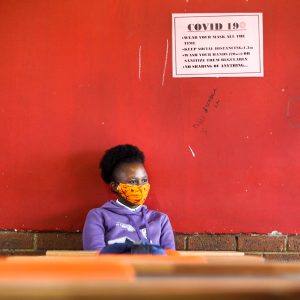Losing Yoyo: The consequences of late NSFAS funding
Yonwaba Manyanya was forced to sleep outside her Durban college when her financial aid funds didn’t arrive in time to pay rent. She died from smoke inhalation and exposure at 26.
Author:
25 June 2021

Desperation and determination pushed Yonwaba Manyanya to sleep outside the gates of the Thekwini Technical and Vocational Education and Training (TVET) College in Durban for three nights, so she could attend classes during the day. Manyanya and some of her peers resorted to this after being kicked out of their accommodation in early May because they couldn’t afford to pay rent.
“It was really cold at night, so they would light a fire to keep warm and it seems she inhaled too much of that smoke and got too cold at night. That is what we were told the results from the postmortem say,” said Yonwaba’s sister, Ongeziwe Manyanya.
The avoidable death of the 26-year-old led to strong criticism and fingers being pointed at the National Student Financial Aid Scheme (NSFAS) as she had been expecting funding from the scheme before she was kicked out of her accommodation.
Manyanya’s case shows how deadly incompetence and financial cuts at the scheme can be. For years, students who depend on the NSFAS for accommodation, food and book allowances have been complaining about late payments that leave them in precarious situations.
Related article:
The financial aid scheme, however, absolved itself of Manyanya’s death. “The allegations are factually incorrect, based on information we have and that the college has. For funding to continue, the student is required to meet the NSFAS progression requirements. While Ms Manyanya was an NSFAS-funded student in 2020, for the 2021 academic year her funding had not been confirmed,” the scheme said.
This fuelled further rage as students questioned how appropriate it was to wait for funding to be confirmed well into the academic year. Shouldn’t all students know where they stand at the beginning of the year, they asked.
Isiphile Mthembu from the Durban University of Technology says he is experiencing the same problem as Manyanya. He has been receiving funding from the NSFAS since 2019, but is in limbo this year as his status hasn’t been confirmed.
“I passed all my modules, not even one module to supplement. But even now, I don’t know what I will eat tonight. It just makes you so depressed, because it doesn’t make sense why my allowance keeps getting delayed. I mean, it’s June now,” said Mthembu.
Faults in the system
Thekwini TVET College principal Nkosinathi Mchunu admits there are faults in the system. “There are challenges with the application and payment of NSFAS allowances and this appears to be the focus of the students. The students were paid late. However, the incident of the passing on of Yonwaba is not related to the payment allowances,” said Mchunu.
“The college grieves for the loss of a young lady whose full potential had not yet been realised and we will be praying for her family during their time of bereavement.”
Manyanya was born in Lusikisiki in the Eastern Cape. She went to Durban to study electrical and infrastructure engineering. Manyanya had two choices when she was kicked out. With her mother and sister unemployed, she had to either go home, the equivalent of giving up on her studies, or find a way to continue attending classes. What she couldn’t have foreseen was the latter leading to her death.
Related article:
“What is making it hard for mom to get closure is the remarks made by officials from the school and NSFAS in the media, claiming they are not responsible in any way for my sister’s death. How can a person’s life be lost and no one wants to account for it? Also, there were stories that had comments from a Mlungisi Manyanya [reported to be Yonwaba’s brother] and we do not know that person. There is only mom and I, now that Yonwaba passed on. Even among our cousins, we don’t know a Mlungisi,” said Ongeziwe.
It was reported in May that the NSFAS approved a budget of R41.5 billion for 2020-2021. This amount excluded the R6.4 billion additional budget approved by Minister of Higher Education and Training Blade Nzimande that is awaiting virement approval from the National Treasury. And yet thousands of students are left in limbo awaiting their approval or allowances, or waiting for their NSFAS wallets to be unlocked so they can access their funding.
The Department of Higher Education and Training said on 7 May that 93 532 TVET college students and 52 992 university students did not receive NSFAS funding for the 2021 academic year. It stated various reasons, such as students not meeting requirements or not submitting certain documents.
Looking closer at TVET colleges, 5 376 previously supported students did not receive funding this year because their academic pathways are not funded as per the guidelines. This is the kind of fickleness that confuses students. If you qualified the year before, how can you now not secure funding for the next year of the same course?
Bleak statistics
Close friend Angel Ndzulu said Manyanya endured much to get to higher education. “I studied with Yonwaba at KwaNompumelelo Junior Secondary School. We were neighbours, but she was also one of my best friends,” said Ndzulu. “I am still in shock over her death. When I think of how much she persevered in high school to be able to get to higher education only to end up in a coffin without completing her studies [it] hurts me so much. She was a loving, carefree spirit and so many people will take a long time to heal from losing Yoyo.”
Manyanya’s determination and death are set against a bleak background of high youth unemployment. Statistics South Africa has revealed that the expanded unemployment rate in the country is at 43.2% and that 63.3% of young people remain without jobs.
Related article:
There is also a percentage of them that is neither studying nor looking for a job, with an air of hopelessness engulfing the South African youth. And seeing those who try get dealt such a hard blow will not inspire others taking action to achieve their dreams.
Ongeziwe says her sister’s biggest dreams were to provide for her two children and buy her mother furniture for the house she built recently, which now stands empty as she can’t afford to furnish it.
“The most difficult thing now is sometimes her seven-year-old asks, ‘When is makazi coming back?’ And we have to explain that she isn’t coming back, she is resting in the garden at the back of the house.”



